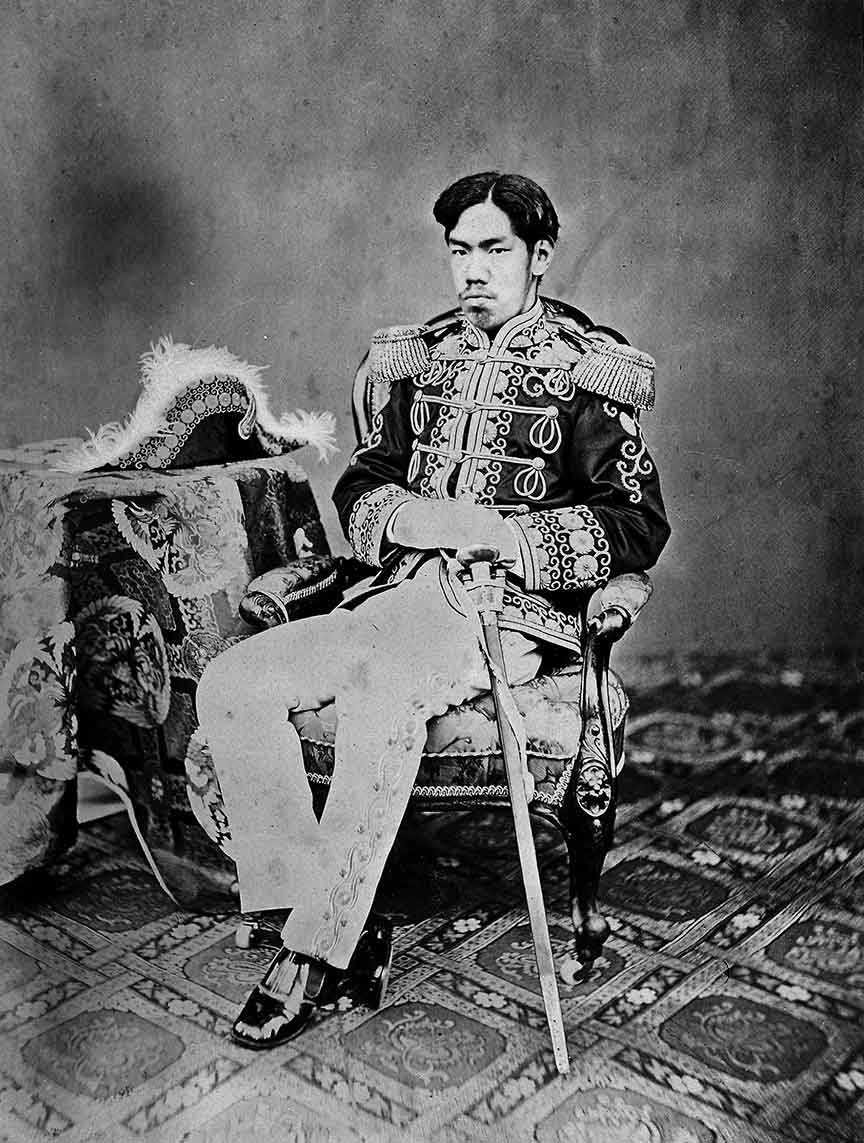Mutsuhito (1852-1912)

Emperor Mutsuhito of Japan, also known as Emperor Meiji, restored imperial power by defeating the shoguns, who had controlled Japan for nearly seven centuries. His 45-year reign brought dramatic changes, including the end of the feudal system, the modernization of Japan’s military, and the establishment of a constitutional government. Mutsuhito’s armies triumphed over China and Russia, shaping Japan into a world power.
Emperor Mutsuhito, known posthumously as Emperor Meiji, is regarded as one of Japan’s most transformative and influential figures. Born in 1852, he ascended to the throne in 1867 at the age of 14, during a time when Japan was undergoing significant turmoil. For almost seven centuries prior, the shoguns—military rulers—had exercised near-total control over Japan’s political landscape, relegating the emperor to a ceremonial and largely powerless role. However, Mutsuhito would change that, leading one of the most dramatic shifts in Japanese history, restoring the emperor to a position of central authority and ushering Japan into the modern era.
The Meiji Restoration, named after Mutsuhito’s era name, “Meiji,” meaning “Enlightened Rule,” began with the emperor reclaiming power after the Boshin War, a civil conflict between forces loyal to the imperial court and the Tokugawa shogunate. The shoguns, who had held sway over the country’s governance since the 12th century, were defeated, and Mutsuhito emerged as the unifying symbol of a new, modern Japan. This was no small feat considering that for centuries, the emperor had been little more than a figurehead, while the shoguns wielded the actual political and military power.
Once in control, Mutsuhito initiated a series of sweeping reforms that fundamentally altered Japan’s societal, political, and economic structures. One of his most significant accomplishments was the abolition of the feudal system in 1871. Under the feudal system, Japan had been divided into domains ruled by powerful local lords known as daimyo. Mutsuhito’s government, however, centralized power, abolishing the domains and replacing them with a more streamlined, modern prefecture system. This not only reduced the power of the daimyo but also allowed for greater national unity and governmental control.
Emperor Meiji also focused on modernizing Japan’s military, recognizing that the country could no longer afford to isolate itself from the rest of the world as it had during the Tokugawa period. Japan opened itself to foreign trade, adopting Western technological advancements and military techniques. Under Mutsuhito’s reign, Japan developed a modern army and navy, modeled largely after European powers. This military modernization contributed to Japan’s growing international stature and success in future conflicts.
Two key military victories during Mutsuhito’s reign were the First Sino-Japanese War (1894-1895) and the Russo-Japanese War (1904-1905). In both conflicts, Japan emerged victorious, gaining territories and cementing its status as a rising power on the world stage. These victories also helped boost national pride and confirmed the effectiveness of Japan’s modernization efforts.
Another critical aspect of Mutsuhito’s rule was the establishment of a constitutional monarchy. In 1889, the Meiji Constitution was promulgated, creating an Imperial Diet and establishing Japan’s first representative government. This new governmental structure balanced imperial authority with modern democratic institutions, reflecting the country’s commitment to both tradition and progress.
Emperor Mutsuhito’s reign lasted for 45 years, from 1867 until his death in 1912. Upon his passing, his son Yoshihito ascended the throne, continuing his father’s legacy. Mutsuhito’s impact on Japan was profound; he is credited with transforming Japan from a feudal, isolated society into a modern, powerful nation capable of standing alongside the world’s great powers. His reign is rightly remembered as a pivotal era in Japanese history, known as the Meiji era, one that shaped the trajectory of the nation for generations to come.
 >
>